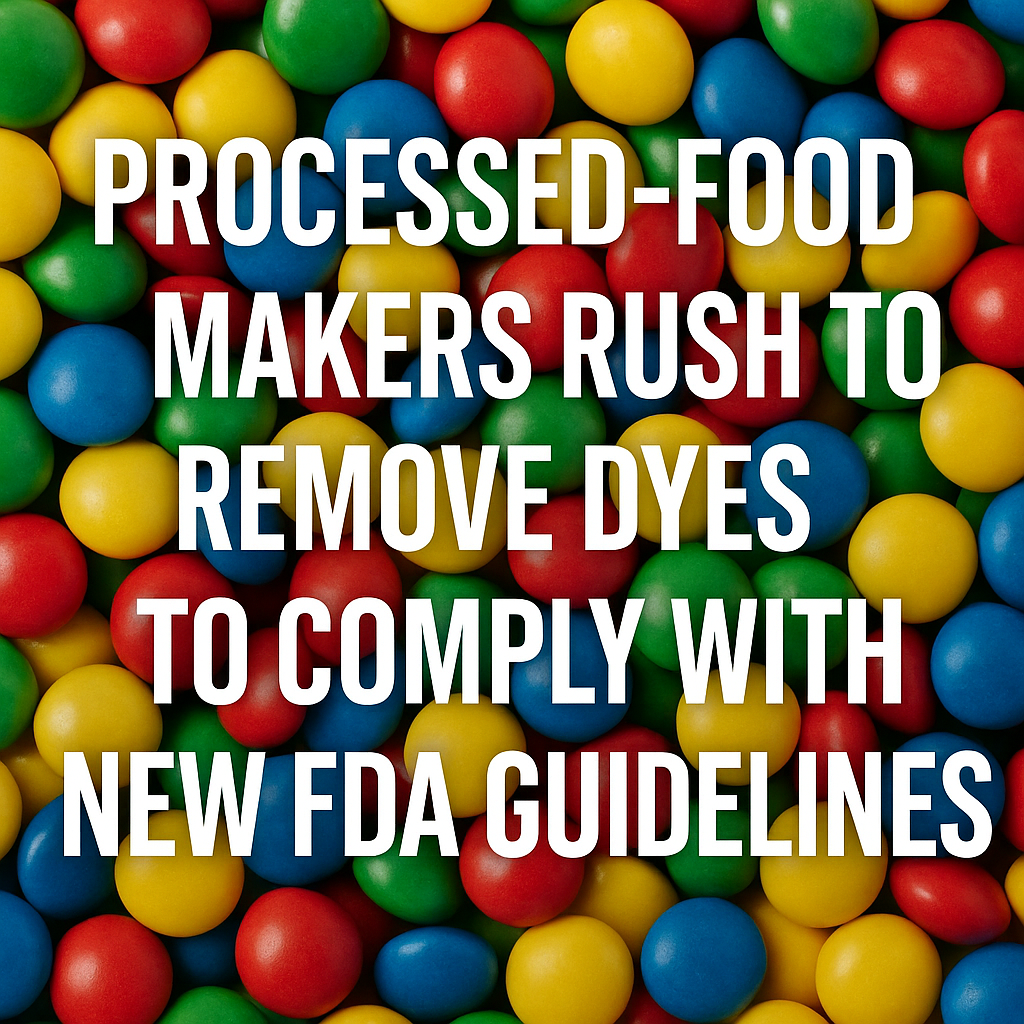Processed-Food Makers Rush To Remove Dyes To Comply With New FDA Guidelines
In a sweeping move set to alter the appearance of countless food products lining America’s grocery shelves, the U.S. Food and Drug Administration (FDA) has announced a phase-out of petroleum-based synthetic food dyes. The guidance, released just this month, directs food manufacturers to eliminate certain artificial colorants—long under scrutiny for their potential health risks—by the end of 2026.
The FDA’s updated policy follows mounting evidence connecting synthetic dyes to beha
In a statement accompanying the new guidelines, Kennedy said, “For too long, some food producers have been feeding Americans petroleum-based chemicals without their knowledge or consent. These poisonous compounds offer no nutritional benefit and pose real, measurable dangers to our children’s health and development.”vioral issues in children and other health concerns, especially among sensitive populations. Dyes such as Red 3, Yellow 5, and Blue 1 have been targeted for elimination. These ingredients have historically been used to enhance the appearance of snacks, cereals, baked goods, and drinks—particularly those marketed to children.
Major food manufacturers, including General Mills, Kraft Heinz, and PepsiCo, have already issued internal memos and public statements acknowledging the shift. In a statement to Just the News, one Kraft executive said, “We are working around the clock to reformulate our products to meet the FDA’s deadline without compromising taste or appearance.”
The FDA maintains that the decision was driven by data, including a recent peer-reviewed review of studies connecting food dyes to hyperactivity in children. While the agency stopped short of calling the ingredients outright toxic, it emphasized the “unnecessary risk” posed by their continued use, especially when natural alternatives are available.
Still, critics of the move point out that the timing and scope raise questions about government overreach and undue pressure on the private sector. “We believe in food safety,” said a spokesperson for the conservative-leaning Consumer Nutrition Alliance, “but the FDA should not be acting as a surrogate parent. American families—not unelected bureaucrats—should decide what goes on their tables.”
The new rules will require companies to label or remove affected ingredients by July 2026, though voluntary compliance is already underway. Products found out of compliance after the deadline could face removal from shelves or costly fines. Smaller companies, particularly regional snack brands, have voiced concern about the cost of reformulating products and sourcing natural alternatives, which are often more expensive and harder to preserve.
This policy change mirrors actions taken in countries like the United Kingdom and Norway, where artificial dyes have been restricted or banned for years. Yet in those nations, religious and cultural values often support a more cautious, even paternalistic approach to food policy. In contrast, the U.S. has historically championed consumer choice and personal responsibility—values that many conservatives argue are being eroded by regulatory overreach.
Dr. Cynthia Warren, a pediatric nutritionist at Texas Family Health Institute, said she supports the change but adds a cautionary note. “There’s no question that reducing synthetic additives is beneficial, especially for children. But this must be paired with consumer education, not just top-down mandates. Parents should know why they’re making better choices, not be forced into them by the state.”
The move comes amid growing parental concern about childhood development and environmental exposure. Ironically, many of the same dyes now being phased out were once advertised as harmless. Red 3, for instance, was approved decades ago, only for later studies to suggest it may be carcinogenic. A 2024 report by the National Institutes of Health confirmed that prolonged exposure in high doses could potentially contribute to thyroid tumors in laboratory animals.
From a biblical worldview, the issue also raises larger ethical questions. Should companies prioritize profits over purity? Should government protect its citizens from harmful additives or respect their freedom to choose, even if they choose poorly? For many Christian families, the FDA’s decision may serve as a wake-up call to more intentionally steward their health and that of their children. 1 Corinthians 10:31 reminds us, “Whether you eat or drink or whatever you do, do it all for the glory of God.”
Food manufacturers now face a logistical and economic challenge. Reformulating hundreds of products without losing consumer trust is no small feat. Many companies are turning to plant-based alternatives like beet juice, turmeric, and spirulina—natural ingredients that not only color but sometimes enhance the health profile of processed foods. However, critics argue these substitutions can be cost-prohibitive, particularly for value-based or school lunch products.
The rollout of this policy also comes at a time when Americans are increasingly skeptical of federal agencies. From the CDC to the Department of Education, there is growing distrust among many conservative households about government motivations. The FDA, while tasked with safeguarding public health, must now walk a tightrope: enforcing food safety standards without triggering backlash from freedom-minded families and small businesses.
As deadlines approach, consumers will likely begin to see noticeable changes on ingredient labels and in the look of familiar products. Whether these changes foster a healthier generation or simply add to the growing list of government mandates remains to be seen. What is certain, however, is that the issue has reignited a national conversation about what we eat, who controls our food supply, and the responsibility each individual bears in protecting their own health and the well-being of their families.

